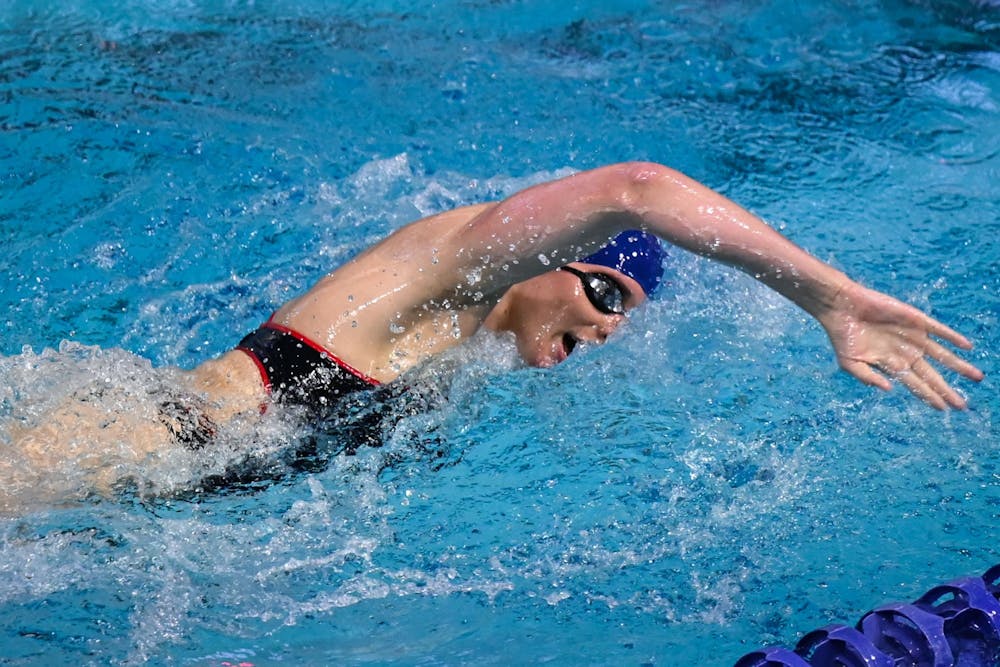
More than 300 current and former NCAA, Team USA, and international swimmers and divers signed an open letter, commissioned by LGTBQ+ advocacy group Athlete Ally, to NCAA leadership in support of Penn women’s swimmer Lia Thomas.
The letter was published on the same day the NCAA announced that it will not adopt USA Swimming’s more rigid policies for transgender athletes ahead of this year’s championship, thus preserving Thomas' eligibility to compete.
The letter, in support of Thomas and all transgender and nonbinary athletes, requested that the NCAA “not adopt USA Swimming’s current policy mid-season, establish clear and consistent guidelines for developing and adopting new eligibility policies, and ensure those policies are adopted and communicated well in advance of the season, and ensure that transgender and nonbinary athletes are directly engaged in the policy development process.”
Six current and former Penn swimmers were among the 322 athletes to have signed the letter in support of Thomas. 36 Harvard athletes and 25 Yale athletes, including both current and former students, were among the signees of support from within the Ivy League.
The letter expressed support for Thomas in that all transgender and nonbinary athletes "deserve to be able to participate in safe and welcoming athletic environments." The letter concluded with a statement that its signees "will not be silent as members of our swim community are unfairly targeted by discriminatory policies."
In her first season on the women’s team, Thomas qualified for the NCAA Championships in the 200, 500, and 1,650-yard freestyle events.
Thomas' success was followed by widespread national media coverage and changes by the NCAA on policies regarding the competition of transgender athletes. According to the first phase of the new NCAA policies, which were announced this season, athletes competing in women’s swimming must not exceed the testosterone limit of five nanomoles per liter for 36 months. Additionally, athletes must provide evidence to a medical committee that they would not hold a “competitive advantage over their cisgender competitors.” This policy reflects the guidelines outlined by USA Swimming, though many other sports only require a period of 12 or 24 months under the testosterone threshold.
The signed letter in support of Thomas asserted that the new NCAA policies were directed unfairly towards Thomas, who began her treatment 33 months ago, falling short of the 36 months as required by the new policy.
Schuyler Bailar, a former Harvard swimmer who was the first transgender athlete to compete in Division I men's swimming, and one of the letter’s commissioners, told Sports Illustrated, “The amount of discrimination [Thomas] has experienced, the amount of hatred, the amount of just blatant cruelty that has been projected and targeted at her, [is] inhumane.” Bailar believes that the new NCAA regulations aren’t just a threat to Thomas, but to “trans people in general, because [they] already are at risk.”
The letter follows a statement from the week prior signed by 16 of Thomas’ teammates at Penn in support of the new NCAA policies potentially affecting her eligibility. This was preceded by a statement released by the women's swimming and diving team expressing support of Thomas.
The Ivy League, with Thomas set to compete in the conference championships this week in Boston, condemned the midseason changes in policy that the NCAA attempted to enact, citing the athletes’ confusion on their eligibility as the main reason.
The women’s swimming and diving NCAA championships are scheduled for March 16-19 in Atlanta.
The Daily Pennsylvanian is an independent, student-run newspaper. Please consider making a donation to support the coverage that shapes the University. Your generosity ensures a future of strong journalism at Penn.
Donate







